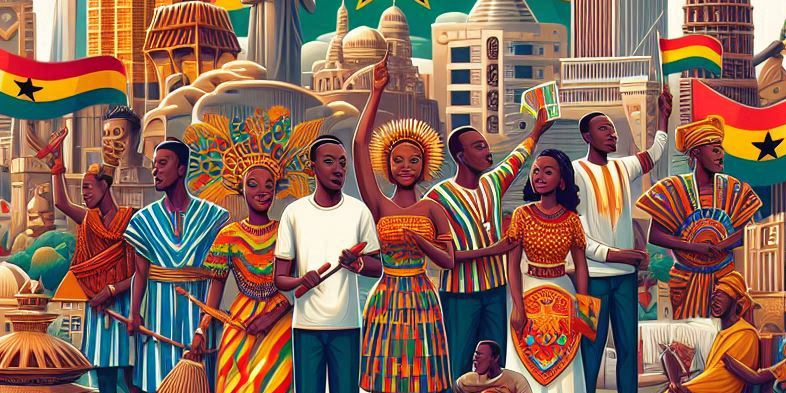Dr. Bawumia will invest in a vibrant tourism and creative arts sector that elevates Ghana’s cultural heritage, expands economic opportunities, and positions Ghana as a premier African destination. His plan includes introducing e-visas and a visa-free policy for African and Caribbean nationals to boost accessibility and foster cultural exchange.
For creatives, Dr. Bawumia proposes regional Creative Hubs, a streaming platform, and a Travel Protocol Service to promote global exposure, along with tracking systems for royalties to ensure industry profitability. He supports preserving heritage through cultural festivals and a Cultural Heritage Fund, archiving historic assets, and partnering with FBOs and CSOs to promote Ghanaian values.
Additionally, Dr. Bawumia to expand value-added industries in cocoa, shea, and jewelry to leverage local resources and create global appeal. In tourism, his focus is on coastal tourism development, regional airport projects, and medical tourism, building a robust tourism infrastructure. Dr. Bawumia’s strategy aligns cultural pride with economic opportunity, aspiring to make Ghana a cultural and tourism leader in Africa.
Frequently Asked Questions
Question 1: How will the e-visa policy benefit the tourism industry and international visitors?
Answer: The implementation of an e-visa policy is aimed at making visa acquisition fast and convenient for international visitors. It simplifies the process, allowing tourists to apply for visas online, reducing the need for long queues at embassies or consulates. This will make Ghana a more attractive destination, particularly for traveller’s looking for a seamless experience. By speeding up the visa process, we expect to increase tourist arrivals, boost the economy, and create more jobs in the tourism and hospitality sectors.
Question 2: What is the Travel Protocol Service (TPS), and how will it support the creative community?
Answer: The Travel Protocol Service (TPS) will streamline and facilitate travel arrangements for Ghanaian artists, musicians, filmmakers, and other creatives traveling internationally for work or exhibitions. This service will ensure that artists have access to visas, travel documentation, and diplomatic support, promoting ease of movement and encouraging global exposure for Ghana’s creative talents.
Question 3: What is the purpose of the Cultural Heritage Fund, and how will it benefit cultural festivals and environmental issues?
Answer: The Cultural Heritage Fund is designed to support and preserve Ghana’s rich cultural heritage, including festivals and environmental conservation efforts. The fund will provide financial resources to organize cultural festivals, which play a significant role in tourism by attracting both local and international visitors. It will also fund initiatives that address environmental challenges related to cultural sites, ensuring that these areas remain attractive and accessible for future generations.
Question 4: How does the government plan to preserve Ghana’s historic films and documents?
Answer: Dr. Bawumia’s government plans to collaborate with stakeholders in tourism, creative arts, and heritage sectors to archive historic films and documents. This will preserve our national heritage and cultural identity for future generations. These archives will be digitized and made accessible to the public and scholars, promoting cultural education and tourism around our historic sites and traditions.
Question 5: How will the proposed streaming platform benefit Ghanaian content developers?
Answer: The streaming platform will provide Ghanaian content creators, such as filmmakers, musicians, and digital artists, with a dedicated platform to distribute their content globally. This initiative will boost visibility, help creators earn revenue from their content through royalties, and promote Ghanaian culture on the international stage. By bypassing third-party platforms, content creators will also retain more control and ownership over their work.
Question 6: What measures will be taken to ensure the fair distribution of royalties to content developers?
Answer: The streaming platform for Ghanaian content will include mechanisms for tracking and distributing royalties to content creators. This system will ensure transparency and fairness in how revenue is generated and distributed. Content developers will have real-time access to their earnings, reducing the risk of unpaid royalties and promoting a more equitable distribution of income within the creative industry.
Question 7: What are the regional Creative Hubs, and what role will they play in nurturing talent?
Answer: The regional Creative Hubs will be physical spaces established across Ghana to nurture and develop local creative talent. These hubs will provide training, mentorship, and access to equipment and resources for young creatives. They will also serve as platforms for collaboration, innovation, and the promotion of creative goods for export, helping the cultural industry grow both locally and internationally.
Question 8: What plans are in place to promote coastal tourism along Ghana’s seafront?
Answer: Dr. Bawumia’s government plans to invest in flood control and coastal protection measures to protect and develop coastal areas for tourism. By preserving our coastlines and promoting hospitality projects along the seafront, we can turn Ghana’s beautiful beaches into world-class tourist destinations. These developments will attract both local and international visitors, boosting the hospitality sector and creating new jobs.


